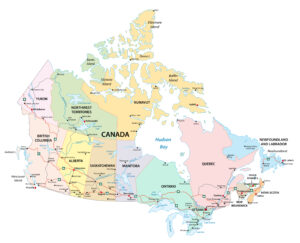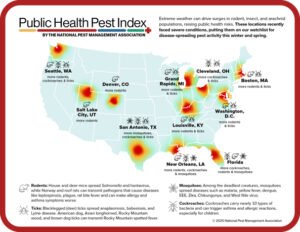If you’ve been seeing numerous mpox articles in the news lately, you may be wondering if you should be concerned and taking precautions against infection. If so, you will be reassured by the CDC statement that the overall risk to the US is very low due to the limited number of travelers to and no direct commercial flights from DRC or its neighboring countries to the US. In fact, the US is donating mpox vaccines to the Democratic Republic of the Congo (DRC) which is experiencing the largest number of annual suspect cases ever recorded.
While mpox itself is not new, with a previous global outbreak having occurred in 2022, the currently circulating Clade 1 is more virulent than Clade II of 2022. It was because of this that the World Health Organization (WHO) has declared the outbreak to be a Public Health Emergency of International Concern due to the rise of Clade I cases in Africa. While no cases of Clade I have been reported thus far in the US, the CDC does recommend that “any person who has traveled to Congo or any bordering countries in the last 21 days and who develops a new, unexplained skin rash should seek medical evaluation and avoid physical contact with others.”
Additionally, with at least one case reported in Europe, the European CDC (ECDC) is recommending enhanced surveillance and preparedness activities as well as the robust healthcare and response capacity. The ECDC also explained that in countries reporting Clade I cases, human-to-human transmission through close physical contact has been documented, however questions remain about the main transmission routes, transmissibility, severity, and natural disease history.
Mpoxis caused by a virus that’s related to smallpox, but it is not spread as easily. It is characterized by a rash that can look like pimples or blisters and appears on the face, inside the mouth, and on other parts of the body. Mpox can be spread from the time symptoms start until the rash has fully healed and a fresh layer of skin formed, which can take several weeks. Because it also can survive on surfaces, which may then serve as transmission sources, any hard surface that could be contaminated by respiratory droplets from an infected person should be cleaned and disinfected. For more information on mpox, its symptoms, and prevention and protection, see TAG’s Infectious Disease Fact Sheet on mpox.
COVID Risk Matrix:
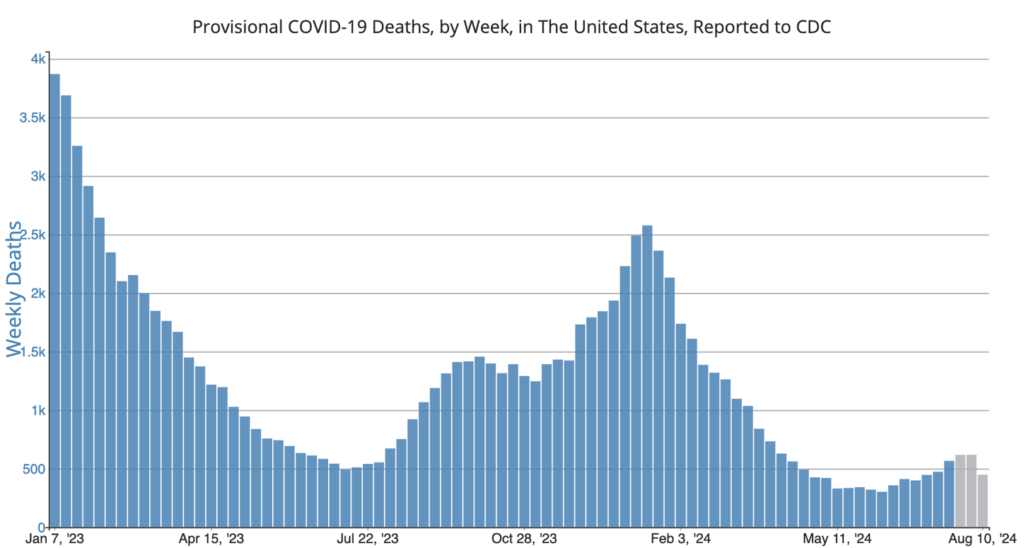
Influenza:
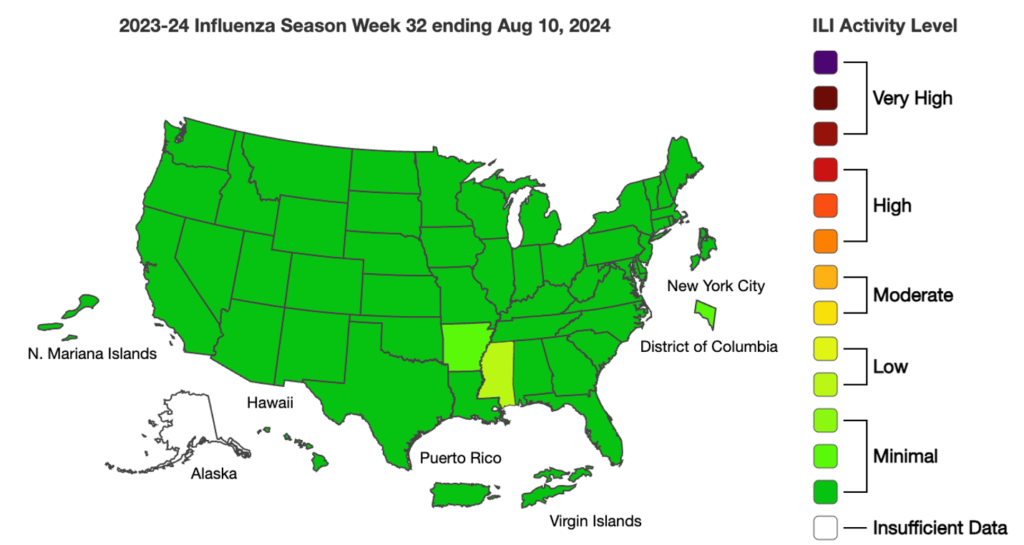
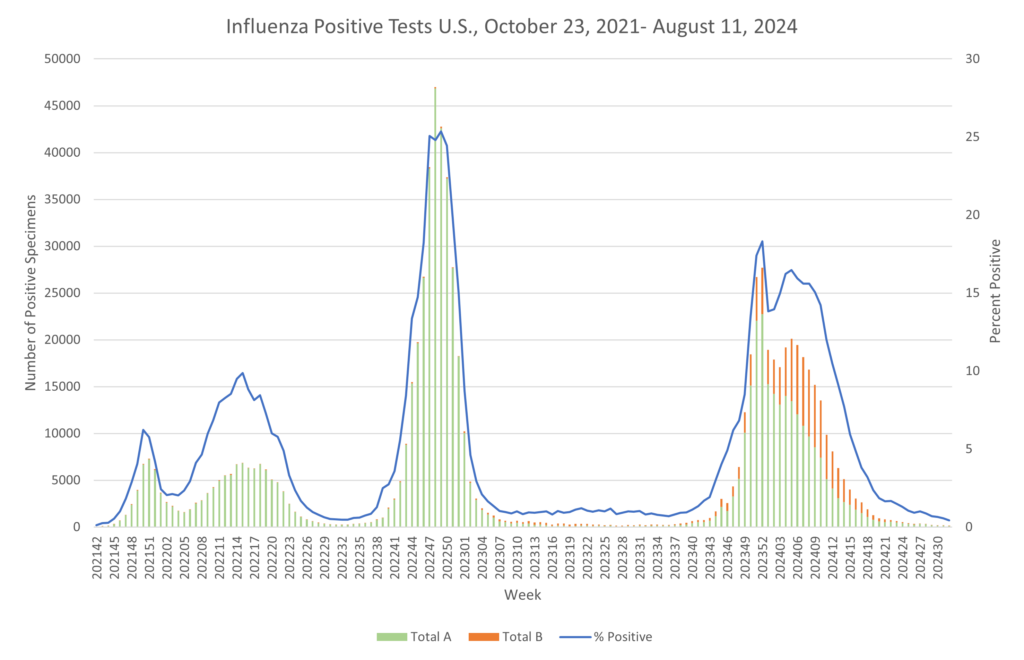
- Colorado Public Radio reported that H5N1 avian flu has been found in domestic house cats in the state, stemming from six cases, primarily in Northern Colorado. Despite concerns, Colorado officials state there is no evidence of human cases linked to infected house cats, and the public risk remains low. The CDC has not observed unusual influenza activity in humans but is prepared with 4.8 million doses of a potential vaccine if needed. Since 2022, H5N1 has affected numerous Colorado mammals and over 100 million birds across the U.S., with no severe human cases reported.
- Pfizer and BioNTech have completed a Phase 3 trial of its combination Flu and COVID vaccine. Against SARS-CoV-2, there were comparable results to their COVID-19 vaccine. “Robust” responses were observed against Influenza A, but against Influenza B, lower efficacy was observed. More than 8,000 adults ages 18-64 were enrolled in the trial.
- The FDA advised consumers in Skip the Antibacterial Soap; Use Plain Soap and Water that “there isn’t evidence to show that over-the-counter (OTC) antibacterial soaps are better at preventing illness than washing with plain soap and water. In fact, some data suggest that antibacterial ingredients could do more harm than good over the long-term.”
- WHO declared a Public Health Emergency of International Concern because of an uptick of mpox cases attributed to a virulent clade 1 of the virus, in Africa centered in The Democratic Republic of Congo. The number of cases reported there so far this year has exceeded last year’s total, with more than 15,600 cases and 537 deaths. At least 100 cases have been reported in bordering countries. Other African countries, such as South Africa, are experiencing spread of the global clade 2 virus.
- At least one mpox case has been reported in Europe and more are highly likely. The European CDC is recommending enhanced surveillance and preparedness activities as well as the robust healthcare and response capacity.
- The CDC has issued a Health Alert Network notice for Oropouche virus after reports of increased activity in Cuba and South America, with 11 travel-related cases reported in the U.S. The virus, spread by biting midges and possibly mosquitoes, has been linked to severe fetal outcomes. The CDC advised clinicians to consider Oropouche virus in patients who traveled to affected areas and to monitor pregnancies closely. A level 2 travel notice has been issued for Cuba, urging pregnant women to reconsider nonessential travel due to the risk to the fetus.


